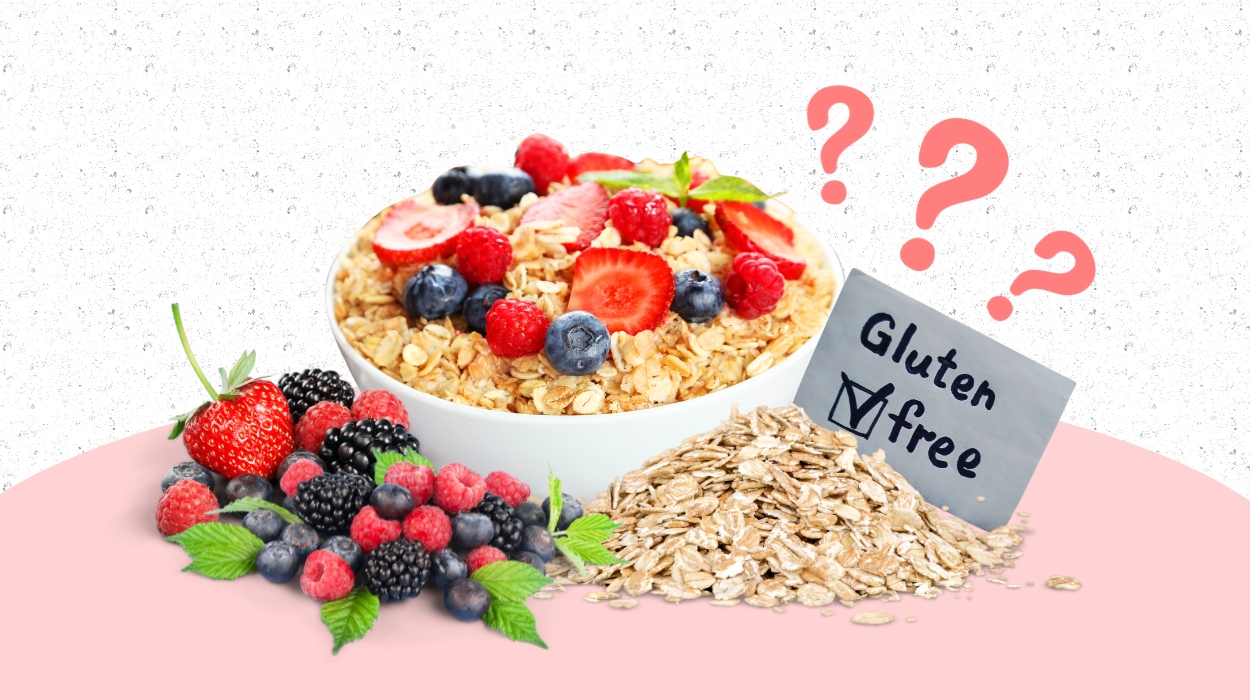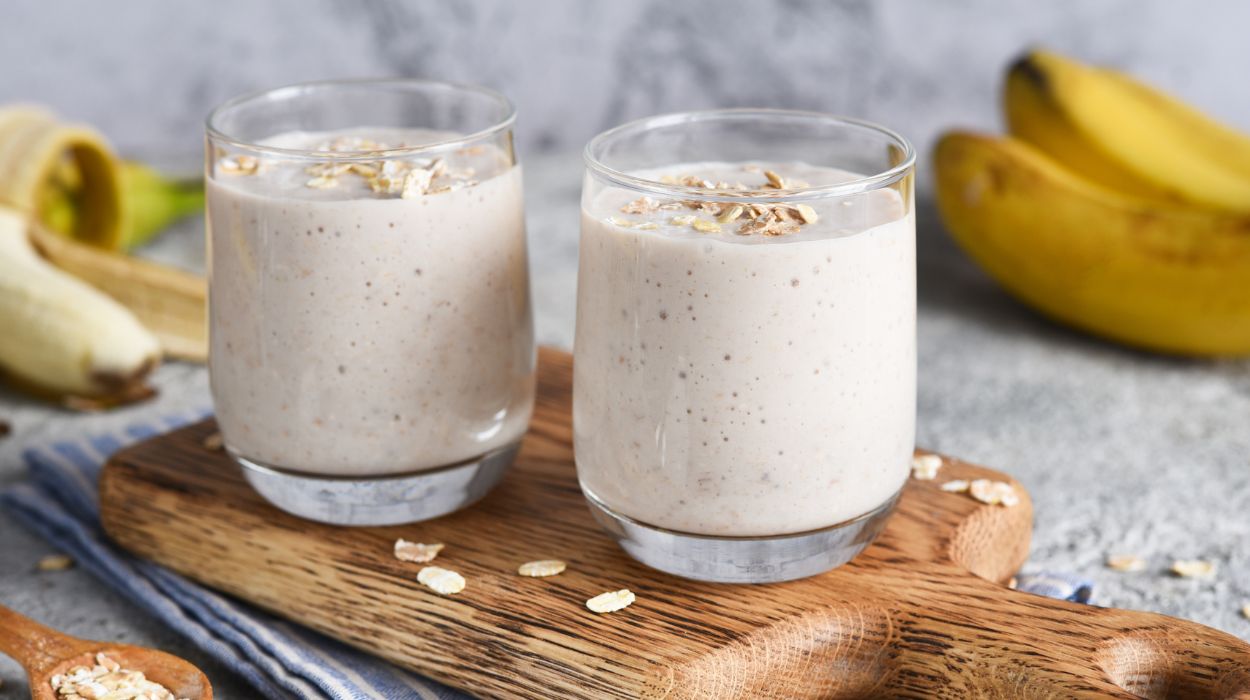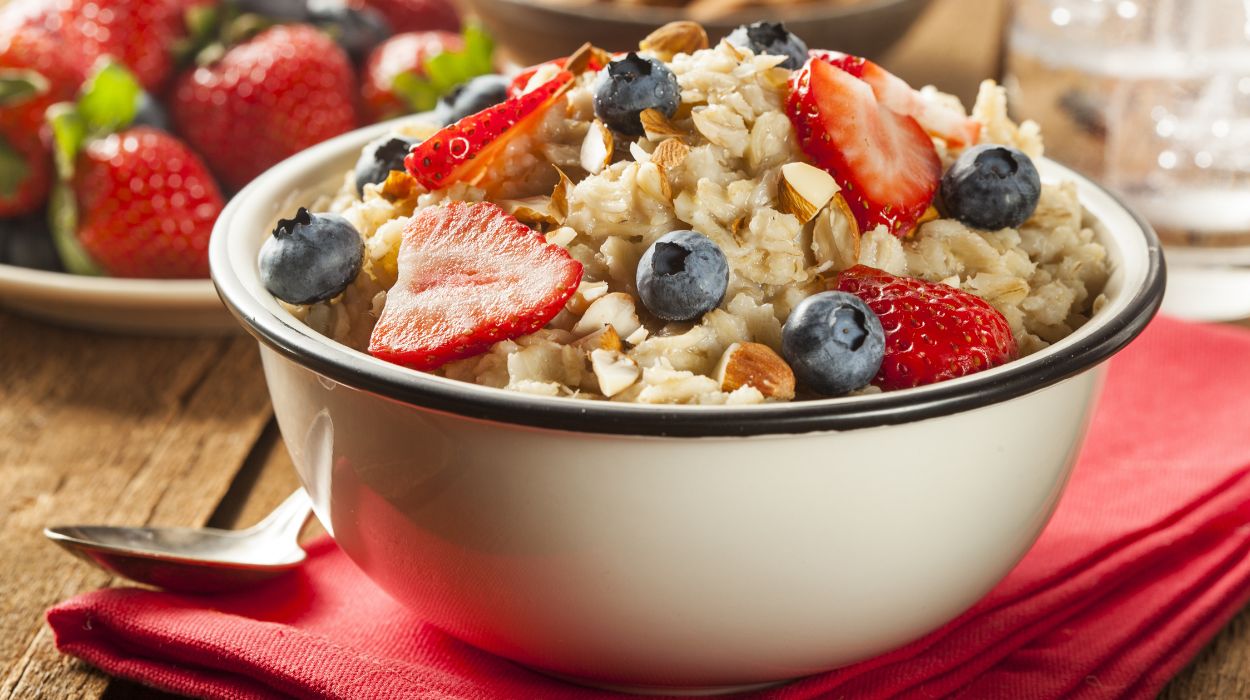 Expert's opinion
Expert's opinion
Expert's opinion
The article is a subjective view on this topic written by writers specializing in medical writing.
It may reflect on a personal journey surrounding struggles with an illness or medical condition, involve product comparisons, diet considerations, or other health-related opinions.
Although the view is entirely that of the writer, it is based on academic experiences and scientific research they have conducted; it is fact-checked by a team of degreed medical experts, and validated by sources attached to the article.
The numbers in parenthesis (1,2,3) will take you to clickable links to related scientific papers.
Is Oatmeal Gluten Free? Uncovering The Truth In 2024

The oatmeal craze is here to stay. This trendy breakfast dish is adored for its delicious taste, simplicity to make, and health benefits.[1] Oatmeal is full of protein, fiber, and essential vitamins.[2] Plus, research shows eating oats aids weight loss. But is oatmeal gluten free?
Oatmeal is naturally gluten free, meaning it doesn’t contain the proteins found in wheat, barley, or rye. This is great news for people who are sensitive or intolerant to gluten. But, cross-contamination[3] can occur during processing and packaging.
Read on to find out how to incorporate oatmeal into your gluten free diet plan.
Is Oatmeal Gluten Free?
Does oatmeal have gluten? No. Oats are gluten free, but cross-contamination with gluten can occur during processing and packaging. People with gluten sensitivities should always check oatmeal is labeled gluten free before consumption.
Why Are People Eating Gluten Free Food?
There are a few reasons why people choose to eat gluten free food.[4]
Celiac Disease
One primary reason is as a treatment for celiac disease.[5] This is an autoimmune disorder where gluten damages the small intestine. There is no cure, so a gluten-free diet is the only way to avoid damage and upsetting symptoms.
Wheat Allergy
Some people are allergic to wheat[6] and have to eliminate all traces of it from their diet. It’s not a reaction to gluten, so people with wheat allergies can eat many gluten-free alternatives. They’re possibly able to eat other gluten-containing grains like barley and rye.
Gluten Sensitivity
Non-celiac gluten sensitivity might be diagnosed after ruling out celiac disease and wheat allergy if a person experiences symptoms after consuming gluten. These symptoms can include abdominal pain, bloating, diarrhea, or fatigue. By removing gluten from their diet, they may find relief from these symptoms.
However, evidence suggests it might not be the gluten that triggers symptoms. Other theories suggest the triggers could be a type of carbohydrate called FODMAPs[7] or even pesticides.
Other Autoimmune Conditions
Research has linked gluten consumption with the worsening of symptoms in some autoimmune disorders other than celiac disease. These include:
- Type 1 diabetes.[8]
- Hashimoto’s thyroiditis.
- Gluten ataxia.[9]
- Psoriasis.
Other than gluten ataxia, there’s currently not enough evidence to recommend a gluten free diet for most of these conditions.
Health Reasons
Some may choose a gluten free diet for personal reasons or preferences, like perceiving it as a healthier diet option.[10]
It’s always best to talk to a healthcare professional before making significant dietary changes, including going gluten free. That’s because a poorly planned gluten free diet can lead to nutritional deficiencies.[11]
Each person’s nutritional needs are unique, so a balanced and personalized approach to eating is recommended.
Are Oats And Oatmeal Always Gluten Free?

Oats and oatmeal are naturally gluten free.[12] Just be cautious if you have gluten sensitivity or celiac disease since oats can become contaminated[3] with gluten. They’re often processed alongside gluten-containing grains. Plus, growing oats[12] near or rotated with wheat crops can also increase the chances of cross-contamination.
Look for oats and oatmeal labeled as gluten free to ensure they’ve been processed in a dedicated gluten free facility. This reduces the risk of cross-contamination. Several well-known brands offer gluten free oatmeal options, so finding a safe and suitable choice for your diet is not difficult.
While oats do not contain gluten, they do contain a similar protein called avenin. Some people with gluten sensitivities[13] may cross-react to avenin. In rare cases, avenin can trigger the same immune response as gluten in individuals with celiac disease. If you notice symptoms after consuming gluten free oats, talk to a healthcare professional for guidance.
How To Know If Oatmeal Is Gluten Free
Firstly, check the package for gluten free certification labels. Look for gluten free oats that have been certified by an organization like the Gluten Free Certification Organization[14] or the National Celiac Association. These organizations ensure that the product you’re consuming contains less than 20 parts per million[15] of gluten — the standard set by the Food and Drug Administration.
Pure oats are naturally gluten free,[12] but the processing and cross-contamination can pose a risk for those with gluten sensitivities. By following these guidelines, you can continue to enjoy your favorite oat-based dishes while keeping your gluten free diet on track.
Embracing Gluten Free Oatmeal In Your Diet
To enjoy oatmeal without any risks, here are a few tips and ideas for incorporating oatmeal into your gluten free diet plan:
Choose Certified Gluten Free Oatmeal
First, always choose certified gluten free oatmeal to minimize the chances of cross-contamination. You can find products with a gluten free label in most supermarkets and online stores.
Bowl Of Oatmeal

Try a classic bowl of oatmeal by mixing rolled or steel-cut oats with your favorite dairy-free milk alternative.
Bring the mixture to a boil, and then reduce the heat to let it simmer. Cook until your desired consistency is achieved, and then sweeten it with maple syrup or honey. Add your favorite low-sugar fruits, nuts, or seeds for extra flavor and texture.
If you’re looking for an extra protein kick, mix gluten free protein powders into your dairy-free milk before adding the oats.
Overnight Oats
Gluten free overnight oats are perfect for busy mornings. Mix oats with your choice of dairy-free milk, yogurt, chia seeds, and your favorite sweeteners and toppings in a jar or container. Let it sit in the refrigerator overnight. The next morning, your breakfast will be ready to eat without any fuss.
As A Flour Substitute In Baking
Oatmeal isn’t just limited to breakfast! Try using gluten free oat flour as a substitute for regular flour in your baking recipes. It works well for pancakes, muffins, and even cookies.
You can also make your own gluten free oat flour at home by grinding gluten free oats in a food processor.
Use As A Substitute For Breadcrumbs
Oats can even be a great addition to gluten free savory dishes. Use them as a substitute for breadcrumbs in recipes like meatloaf or veggie burgers. Simply grind oats into a fine texture to mimic the consistency of traditional breadcrumbs.
Just remember to always double-check ingredient labels and ensure you’re using certified gluten free products for a worry-free, oatmeal-filled diet.
Conclusion
Oats don’t have any gluten-containing proteins found in wheat, barley, and rye. If you have gluten sensitivity or celiac disease, always buy certified gluten free oatmeal products to avoid cross-contamination. This ensures that the oatmeal has undergone rigorous testing and does not exceed the allowed gluten threshold.
However, even gluten free oats may not be safe for some. Oats contain a protein called avenin, which some individuals with celiac disease or gluten sensitivity may react to. Therefore, paying attention to your body’s response when incorporating gluten free oatmeal into your diet is important.
Gluten free oatmeal can be a healthy, nutrient-rich option providing fiber, vitamins, and minerals. Just remember always to double-check product labels and opt for certified gluten free options to avoid potential cross-contamination.
There is also a range of certified gluten free delivery services and gluten free meal replacement bars available.
Frequently Asked Questions
Yes, oats are naturally gluten-free. However, some oats can become cross-contaminated with gluten during production and processing. If you need to ensure your oats are completely gluten-free, look for certified gluten-free oats.
Cross-contamination with gluten-containing grains during processing and packaging is common. Oatmeal that is not labeled as certified gluten-free or does not have a gluten-free claim on the package may not be safe for people with gluten-related disorders or sensitivities.
Gluten-free oatmeal has undergone testing and meets the required standards to be considered safe for people avoiding gluten. Some examples of reputable gluten-free brands can be found on the Gluten-Free Certification Organization’s website.
By the same principle as oatmeal, oat flour is gluten-free. However, it is at risk of cross-contamination in its processing and packaging, so care should be taken.
+ 15 sources
Health Canal avoids using tertiary references. We have strict sourcing guidelines and rely on peer-reviewed studies, academic researches from medical associations and institutions. To ensure the accuracy of articles in Health Canal, you can read more about the editorial process here
- Fulgoni, V.L., Brauchla, M., Fleige, L. and Chu, Y. (2019). Oatmeal-Containing Breakfast is Associated with Better Diet Quality and Higher Intake of Key Food Groups and Nutrients Compared to Other Breakfasts in Children. [online] 11(5), pp.964–964. doi:https://doi.org/10.3390/nu11050964.
- Usda.gov. (2023). FoodData Central. [online] Available at: https://fdc.nal.usda.gov/fdc-app.html#/food-details/2346396/nutrients
- Marinus J. M. Smulders, van, van, Ingrid, T.P.M. Israel-Hoevelaken, Timmer, R.D., Jan, B., Braun, S. and Luud J.W.J. Gilissen (2018). Oats in healthy gluten-free and regular diets: A perspective. [online] 110, pp.3–10. doi:https://doi.org/10.1016/j.foodres.2017.11.031.
- Medlineplus.gov. (2021). Learn about gluten-free diets: MedlinePlus Medical Encyclopedia. [online] Available at: https://medlineplus.gov/ency/patientinstructions/000813.htm
- and, D. (2023). Celiac Disease – NIDDK. [online] National Institute of Diabetes and Digestive and Kidney Diseases. Available at: https://www.niddk.nih.gov/health-information/digestive-diseases/celiac-disease
- Cabanillas, B. (2019). Gluten-related disorders: Celiac disease, wheat allergy, and nonceliac gluten sensitivity. [online] 60(15), pp.2606–2621. doi:https://doi.org/10.1080/10408398.2019.1651689.
- Feliznando Isidro Cárdenas-Torres, Cabrera-Chávez, F., Oscar Gerardo Figueroa-Salcido and Ontiveros, N. (2021). Non-Celiac Gluten Sensitivity: An Update. [online] 57(6), pp.526–526. doi:https://doi.org/10.3390/medicina57060526.
- Moschoula Passali, Knud Josefsen, Frederiksen, J.L. and Antvorskov, J.C. (2020). Current Evidence on the Efficacy of Gluten-Free Diets in Multiple Sclerosis, Psoriasis, Type 1 Diabetes and Autoimmune Thyroid Diseases. [online] 12(8), pp.2316–2316. doi:https://doi.org/10.3390/nu12082316.
- Bara Aljada, Zohni, A. and Wael El-Matary (2021). The Gluten-Free Diet for Celiac Disease and Beyond. [online] 13(11), pp.3993–3993. doi:https://doi.org/10.3390/nu13113993.
- Niland, B. and Cash, B.D. (2018). Health Benefits and Adverse Effects of a Gluten-Free Diet in Non-Celiac Disease Patients. Gastroenterology & hepatology, [online] 14(2), pp.82–91. Available at: https://www.ncbi.nlm.nih.gov/pmc/articles/PMC5866307/
- Giorgia Vici, Belli, L.S., Biondi, M. and Polzonetti, V. (2016). Gluten free diet and nutrient deficiencies: A review. [online] 35(6), pp.1236–1241. doi:https://doi.org/10.1016/j.clnu.2016.05.002.
- Luud J.W.J. Gilissen, van and Marinus J. M. Smulders (2016). Why Oats Are Safe and Healthy for Celiac Disease Patients. [online] 4(4), pp.21–21. doi:https://doi.org/10.3390/medsci4040021.
- Václav Dvořáček, Kotrbova-Kozak, A., Kozová-Doležalová, J., Jágr, M., Petra Hlásná Čepková, Pavel Vítámvás and Klára Kosová (2022). Specific Avenin Cross-Reactivity with G12 Antibody in a Wide Range of Current Oat Cultivars. [online] 11(4), pp.567–567. doi:https://doi.org/10.3390/foods11040567.
- Gluten-Free Certification Organization. (2022). Home – Gluten-Free Certification Organization. [online] Available at: https://gfco.org/
- Office (2023). ‘Gluten-Free’ Now Means What It Says. [online] U.S. Food and Drug Administration. Available at: https://www.fda.gov/consumers/consumer-updates/gluten-free-means-what-it-says#:~:text=As%20one%20of%20the%20criteria,using%20valid%20scientific%20analytical%20tools.



